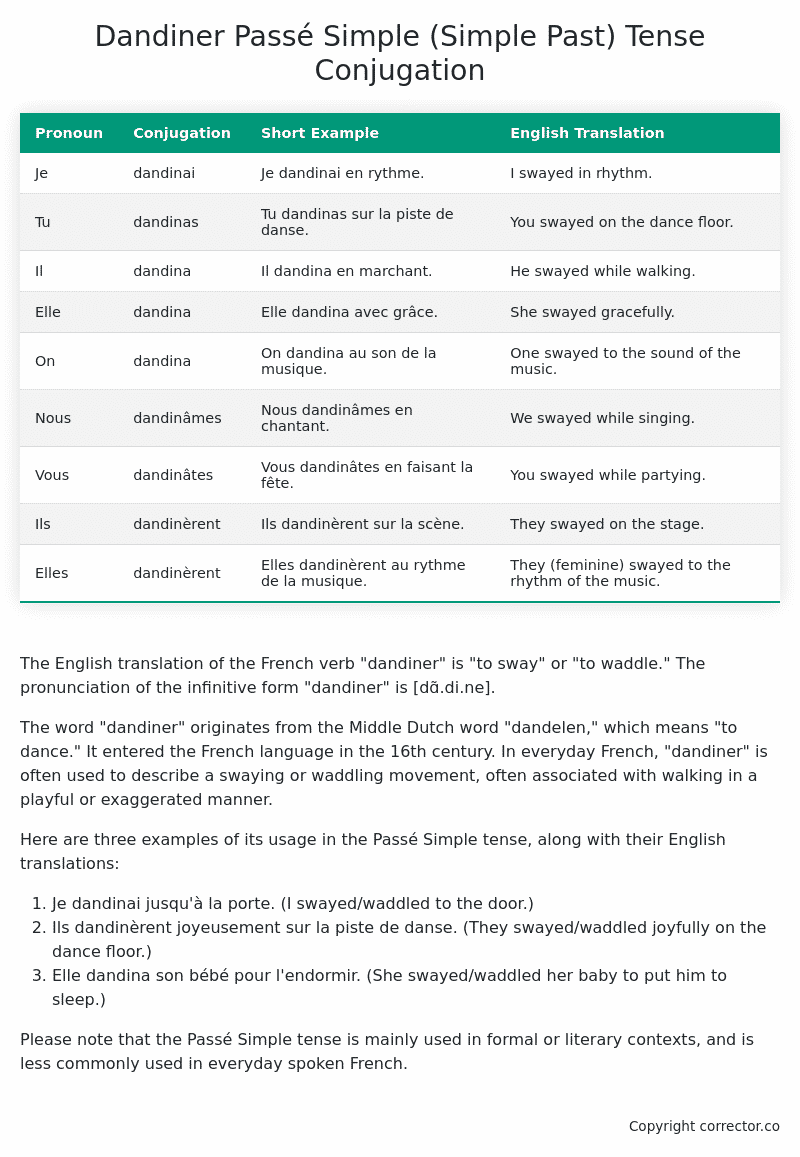Passé Simple (Simple Past) Tense Conjugation of the French Verb dandiner
Introduction to the verb dandiner
The English translation of the French verb “dandiner” is “to sway” or “to waddle.” The pronunciation of the infinitive form “dandiner” is [dɑ̃.di.ne].
The word “dandiner” originates from the Middle Dutch word “dandelen,” which means “to dance.” It entered the French language in the 16th century. In everyday French, “dandiner” is often used to describe a swaying or waddling movement, often associated with walking in a playful or exaggerated manner.
Here are three examples of its usage in the Passé Simple tense, along with their English translations:
- Je dandinai jusqu’à la porte. (I swayed/waddled to the door.)
- Ils dandinèrent joyeusement sur la piste de danse. (They swayed/waddled joyfully on the dance floor.)
- Elle dandina son bébé pour l’endormir. (She swayed/waddled her baby to put him to sleep.)
Please note that the Passé Simple tense is mainly used in formal or literary contexts, and is less commonly used in everyday spoken French.
Table of the Passé Simple (Simple Past) Tense Conjugation of dandiner
| Pronoun | Conjugation | Short Example | English Translation |
|---|---|---|---|
| Je | dandinai | Je dandinai en rythme. | I swayed in rhythm. |
| Tu | dandinas | Tu dandinas sur la piste de danse. | You swayed on the dance floor. |
| Il | dandina | Il dandina en marchant. | He swayed while walking. |
| Elle | dandina | Elle dandina avec grâce. | She swayed gracefully. |
| On | dandina | On dandina au son de la musique. | One swayed to the sound of the music. |
| Nous | dandinâmes | Nous dandinâmes en chantant. | We swayed while singing. |
| Vous | dandinâtes | Vous dandinâtes en faisant la fête. | You swayed while partying. |
| Ils | dandinèrent | Ils dandinèrent sur la scène. | They swayed on the stage. |
| Elles | dandinèrent | Elles dandinèrent au rythme de la musique. | They (feminine) swayed to the rhythm of the music. |
Other Conjugations for Dandiner.
Le Present (Present Tense) Conjugation of the French Verb dandiner
Imparfait (Imperfect) Tense Conjugation of the French Verb dandiner
Passé Simple (Simple Past) Tense Conjugation of the French Verb dandiner (You’re reading it right now!)
Passé Composé (Present Perfect) Tense Conjugation of the French Verb dandiner
Futur Simple (Simple Future) Tense Conjugation of the French Verb dandiner
Futur Proche (Near Future) Tense Conjugation of the French Verb dandiner
Plus-que-parfait (Pluperfect) Tense Conjugation of the French Verb dandiner
Passé Antérieur (Past Anterior) Tense Conjugation of the French Verb dandiner
Futur Antérieur (Future Anterior) Tense Conjugation of the French Verb dandiner
Subjonctif Présent (Subjunctive Present) Tense Conjugation of the French Verb dandiner
Subjonctif Passé (Subjunctive Past) Tense Conjugation of the French Verb dandiner
Subjonctif Imparfait (Subjunctive Imperfect) Tense Conjugation of the French Verb dandiner
Subjonctif Plus-que-parfait (Subjunctive Pluperfect) Tense Conjugation of the French Verb dandiner
Conditionnel Présent (Conditional Present) Tense Conjugation of the French Verb dandiner
Conditionnel Passé (Conditional Past) Tense Conjugation of the French Verb dandiner
Conditionnel Passé II (Conditional Past II) Tense Conjugation of the French Verb dandiner
L’impératif Présent (Imperative Present) Tense Conjugation of the French Verb dandiner
L’impératif Passé (Imperative Past) Tense Conjugation of the French Verb dandiner
L’infinitif Présent (Infinitive Present) Tense Conjugation of the French Verb dandiner
L’infinitif Passé (Infinitive Past) Tense Conjugation of the French Verb dandiner
Le Participe Présent (Present Participle) Tense Conjugation of the French Verb dandiner
Le Participe Passé (Past Participle) Tense Conjugation of the French Verb dandiner
Struggling with French verbs or the language in general? Why not use our free French Grammar Checker – no registration required!
Get a FREE Download Study Sheet of this Conjugation 🔥
Simply right click the image below, click “save image” and get your free reference for the dandiner Passé Simple tense conjugation!

Dandiner – About the French Passé Simple (Simple Past) Tense
Formation
Usage
Narration
Historical Context
Interactions with other tenses
Passé Composé
Imparfait
Conditional and Subjunctive
Summary
I hope you enjoyed this article on the verb dandiner. Still in a learning mood? Check out another TOTALLY random French verb conjugation!


